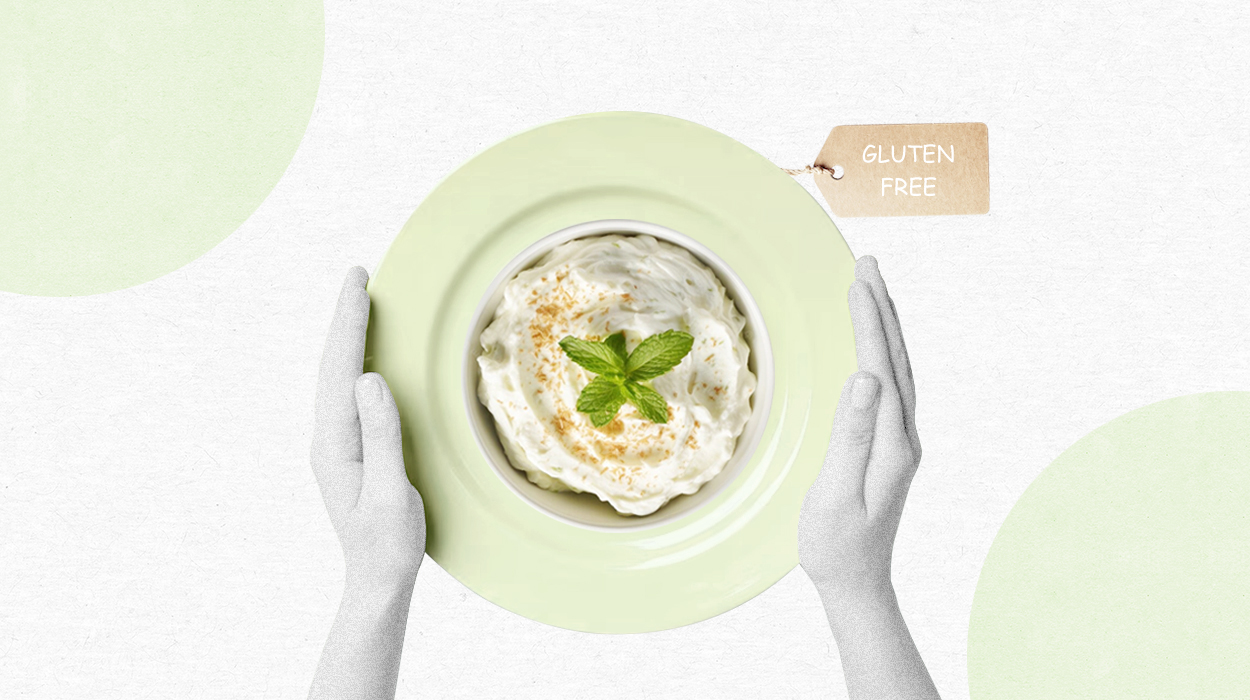 Expert's opinion
Expert's opinion
Expert's opinion
The article is a subjective view on this topic written by writers specializing in medical writing.
It may reflect on a personal journey surrounding struggles with an illness or medical condition, involve product comparisons, diet considerations, or other health-related opinions.
Although the view is entirely that of the writer, it is based on academic experiences and scientific research they have conducted; it is fact-checked by a team of degreed medical experts, and validated by sources attached to the article.
The numbers in parenthesis (1,2,3) will take you to clickable links to related scientific papers.
Is Sour Cream Gluten Free? Find Out The Answer With Nutrition Experts In 2024

So, you’re on a gluten-free diet and wondering, is sour cream gluten-free? Well, here’s the scoop: Most sour cream brands are gluten-free. But — and it’s a big but — some brands might sneak in gluten ingredients, or a sour cream product might become contaminated with gluten during the production process.
If you’ve got celiac disease or a gluten intolerance, make sure to check those labels. Not all sour cream containers will state gluten-free, so you might have to check the ingredients list.
So, can you put sour cream on your gluten-free baked potatoes? Whether you’re following a gluten-free diet plan or just curious, read on to learn all you need to know about sour cream’s gluten status.
Is Sour Cream Gluten Free?
Yes, sour cream is typically gluten-free as the basic ingredients don’t contain gluten. It’s made from fermenting regular cream with certain bacteria.
However, some brands might add thickeners or stabilizers that contain gluten, or there could be cross-contamination with gluten-containing grains during the manufacturing process. Always check the label if you need to avoid gluten.
Does Sour Cream Have Gluten?
So you’re wondering if there is a connection between sour cream and gluten?
Sour cream is a dairy product made by fermenting cream with specific bacteria. This fermentation process gives it that taste we all enjoy. As these basic ingredients are naturally gluten-free, sour cream is considered gluten-free.
That means the fermented cream doesn’t contain any gluten. Whether you add a dollop to your recipes or enjoy it with baked potatoes, plain sour cream is safe on a gluten-free diet.
You might wonder why sour cream brands don’t explicitly label it[1] as gluten-free. Since sour cream is naturally free from gluten, most sour cream brands assume that consumers already know. As such, the cost of the certified gluten-free mark doesn’t seem necessary.
However, not all sour cream brands follow safe protocols. Some may incorporate thickeners or stabilizers that could potentially contain traces of gluten.
Then there’s another factor known as cross-contamination.[2] Some sour cream is made in factories that handle gluten-containing products, which could potentially find its way into your cream. It’s important to examine the ingredient list for any allergen warnings or hidden sources of gluten.
If you have gluten sensitivity, it may be worth contacting the manufacturer to inquire about their handling procedures.
What Is Sour Cream?
Sour cream is a type of cultured cream — a fermented dairy product enjoyed for its tangy flavor. It’s usually used as a cooking ingredient or tangy condiment. But what exactly is it, how is it made, and what about those gluten ingredients in certain sour creams?
Traditional sour cream is made[3] by fermenting regular dairy cream with specific lactic acid bacteria. This fermentation process[4] gives cultured cream its characteristic sour flavor, optimized to improve sensory attractiveness.
Now, while regular sour cream is naturally gluten-free, some manufacturers might add thickeners or stabilizers to enhance the texture and shelf-life. These additional ingredients could contain gluten. If the sour cream is processed in a facility that also handles gluten-containing grains, there’s also a risk of cross-contamination.
Ways To Use Sour Cream On The Gluten-Free Diet
Sour cream is one of those ingredients that adds that extra flavor touch to a gluten-free dish. If you follow a gluten-free diet, here are some delightful ways to enjoy sour cream:
- Dips and Sauces: Mix some herbs and spices with sour cream to make a tasty dip for gluten-free chips or veggies. It also works wonders as a thickener for your gravies and sauces.
- Baking: Looking to make your gluten-free cakes, muffins, and bread more moist and flavorful? Just add a dollop of cream.
- Toppings: Whether it’s potatoes, tacos, or nachos, they all crave that addition of cream.
- Salad Dressings: Give your salads a twist by mixing sour cream with other ingredients to create tangy gluten-free dressings.
- Soups and Stews: Want to elevate the creaminess of your soups and stews? Simply stir in some sour cream.
- Gluten-Free Casseroles: Enhance your casseroles with a touch of sour cream.
- Gluten-Free Pasta Dishes: You can increase the joy of eating gluten-free pasta by incorporating sour cream into your pasta sauces.
- Mashed Potatoes: Elevate your mash by incorporating a dollop of sour cream.
These popular ways to use sour cream are delicious and completely gluten-free.
Best Gluten-Free Substitutes For Sour Cream
But what if you’re also avoiding dairy products or have run out of sour cream? Don’t worry. If following a vegan diet, you can find versions made from coconut milk and other plant-based ingredients. Just watch for sneaky gluten sources, like wheat products or modified food starch.
Here are some popular gluten-free foods to try as sour cream substitutes:
- Greek Yogurt: Greek yogurt is thick and creamy and has a tangy flavor that resembles sour cream. It’s an alternative, especially when used in dips or dressings.
- Coconut Cream: For those who follow a dairy-free diet, coconut cream can be a game changer. Its richness adds a twist to your dishes.
- Silken Tofu: To make sour cream vegan-friendly, blend tofu with vinegar or lemon juice, and you’ll discover a dairy-free gluten-free substitute that closely resembles the real deal.
- Mayonnaise: When in need of something in a pinch, mayonnaise can do the trick in recipes where you desire creaminess rather than tanginess. Just remember to maintain balance as it may contain a high amount of calories and fats.
- Cottage Cheese: Blend cottage cheese until it becomes smooth. This provides an option that still retains a creamy texture. If you prefer a tangier taste, add a splash of lemon juice.
- Almond Milk Yogurt: For those looking for a dairy-free option, almond milk yogurt can be a great substitute, especially if you opt for the thicker, unsweetened variety.
- Lactose-Free Sour Cream: If you are lactose intolerant, you will have to avoid regular sour cream. Opt for lactose-free sour cream, specifically designed for individuals with lactose intolerance but who still crave that delicious sour cream flavor.
- Vinegar and Cream Blend: Mix a little vinegar with heavy cream to replicate the tangy flavor of sour cream. This technique can come in handy when you’re in need of a quick substitute.
- Cream Cheese: Blend cream cheese with a little milk, water, or lemon juice to make it thinner to use as a sour cream substitute.
Some people following a gluten-free diet benefit from meal delivery systems or meal replacement bars. But keep in mind to consult your doctor and registered dietitian if you’re planning to use nutrition supplements like protein powder, fat burner, or vitamins.
Conclusion
Sour cream is a wonderful addition to many dishes, and it’s naturally gluten-free. However, not all sour cream brands are the same. Some might add gluten-containing ingredients or be subject to cross-contamination. So, enjoy your tangy treat without the gluten worry, but always be vigilant with those labels.
So, when you’re whipping up your favorite sweet and savory recipes on a gluten-free diet plan, be a label detective. So, go ahead and enjoy sour cream without the gluten stress.
Frequently Asked Questions
Yes, most sour cream is naturally gluten-free, but it’s essential to check labels for potential gluten-containing ingredients or cross-contamination.
Sour cream is made from fresh cream made from cow’s milk. It’s fermented with specific bacteria to give it a tangy flavor.
Yes, plain cream is naturally gluten-free, but always check labels for added gluten-containing ingredients.
Sour cream typically contains lactose, but lactose-free versions are available.
Yes, dairy-free sour cream is available. It’s made from ingredients like coconut milk, almond milk, or other plant-based products.
+ 4 sources
Health Canal avoids using tertiary references. We have strict sourcing guidelines and rely on peer-reviewed studies, academic researches from medical associations and institutions. To ensure the accuracy of articles in Health Canal, you can read more about the editorial process here
- Center (2022). Gluten and Food Labeling. [online] U.S. Food and Drug Administration. Available at: https://www.fda.gov/food/nutrition-education-resources-materials/gluten-and-food-labeling
- Wieser, H., Segura, V., Ángela Ruiz-Carnicer, Sousa, C. and Comino, I. (2021). Food Safety and Cross-Contamination of Gluten-Free Products: A Narrative Review. Nutrients, [online] 13(7), pp.2244–2244. doi:https://doi.org/10.3390/nu13072244.
- Yu, J., Mo, L., Pan, L., Yao, C., Ren, D., An, X., Tsedensodnom Tsogtgerel, Zhang, H. and Liu, W. (2018). Bacterial Microbiota and Metabolic Character of Traditional Sour Cream and Butter in Buryatia, Russia. Frontiers in Microbiology, [online] 9. doi:https://doi.org/10.3389/fmicb.2018.02496.
- Dragan Milić, Danica Glavaš Trbić, Mirela Tomaš-Simin and Popov, M. (2019). Economic characteristics of sour cream production in small-scale dairy processors in Serbia. [online] ResearchGate. Available at: https://www.researchgate.net/publication/336428936_Economic_characteristics_of_sour_cream_production_in_small-scale_dairy_processors_in_Serbia



